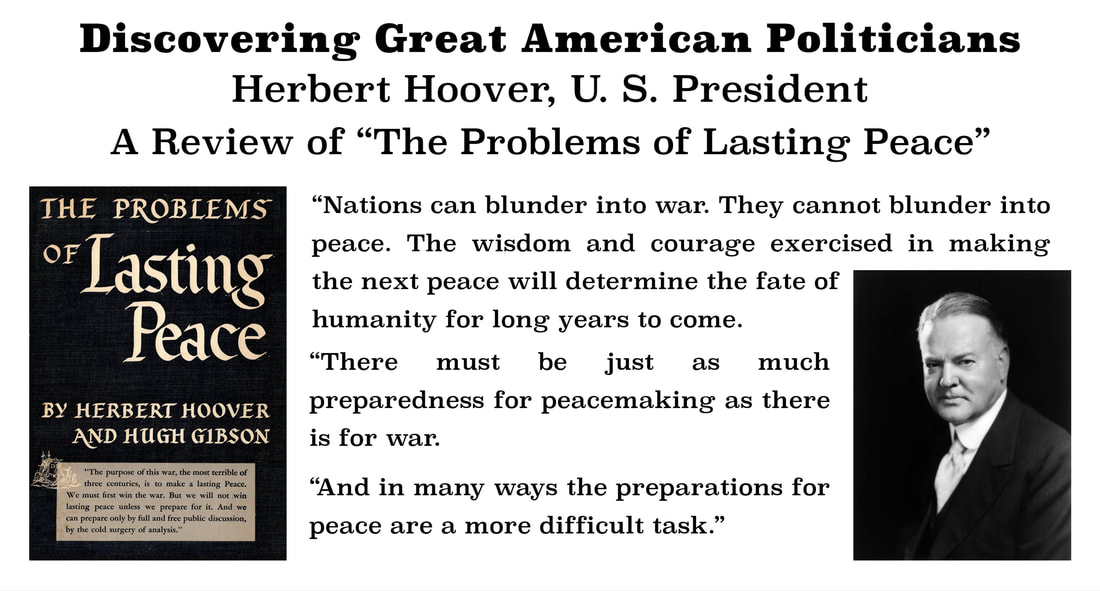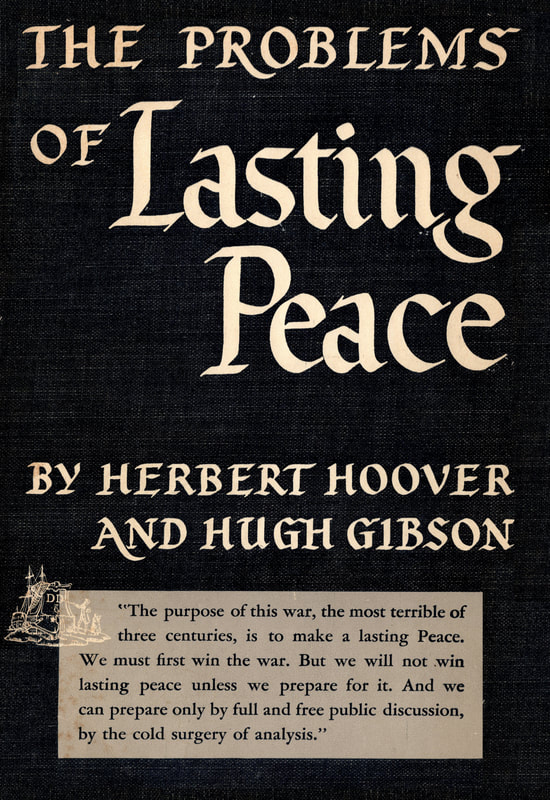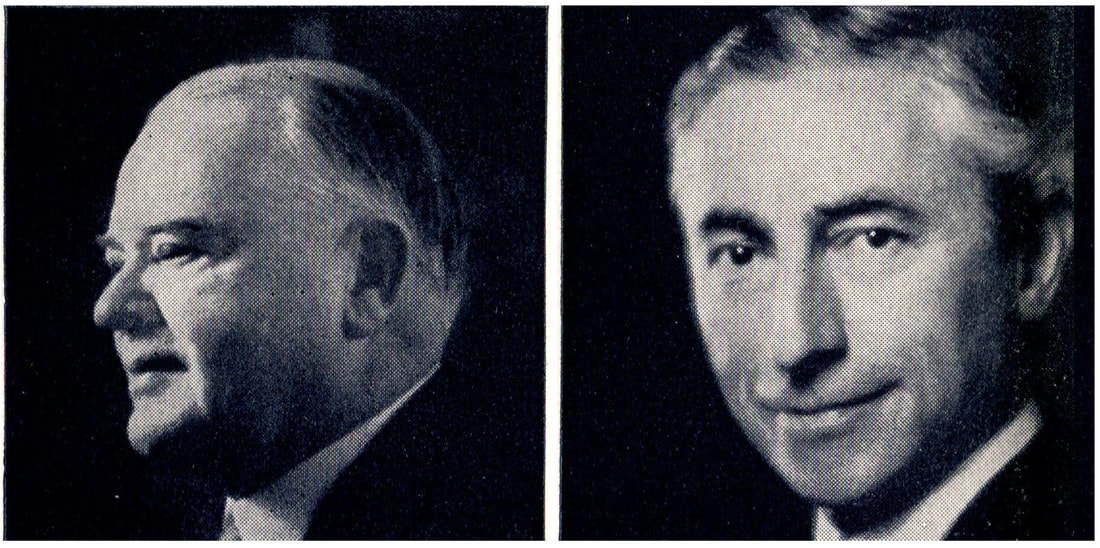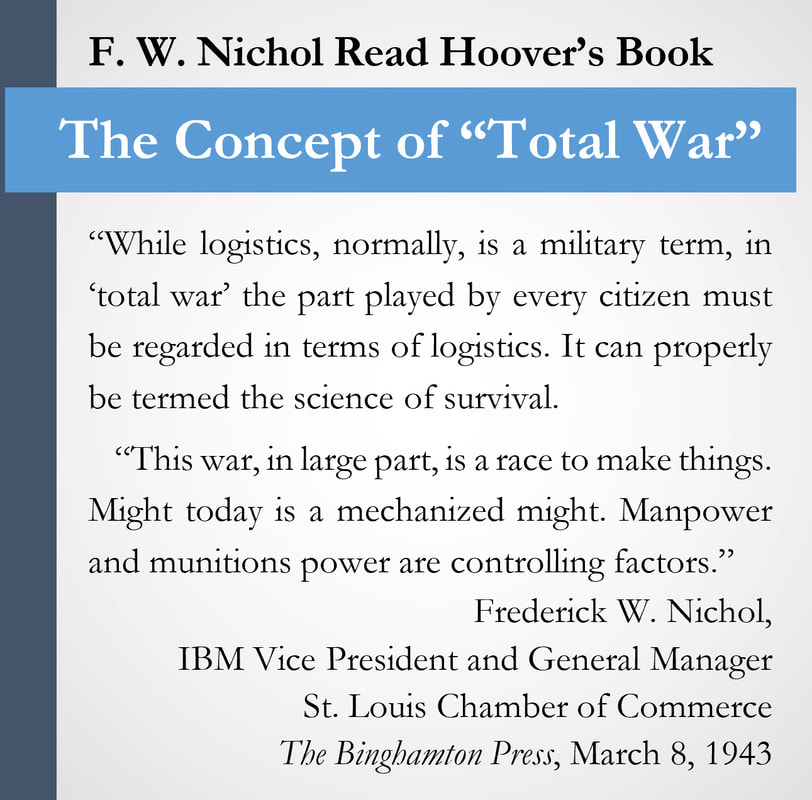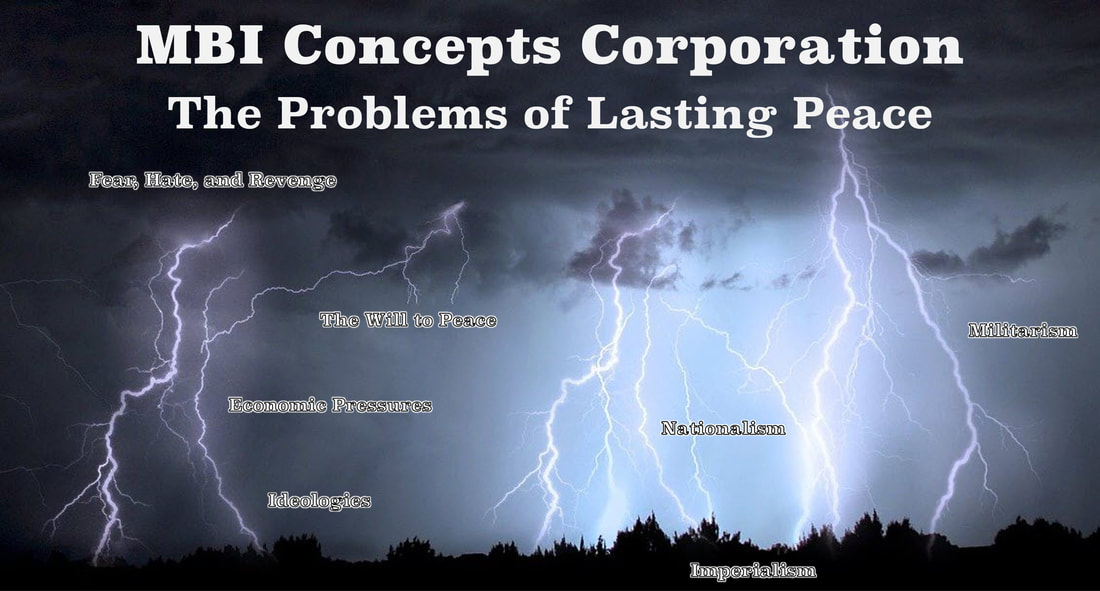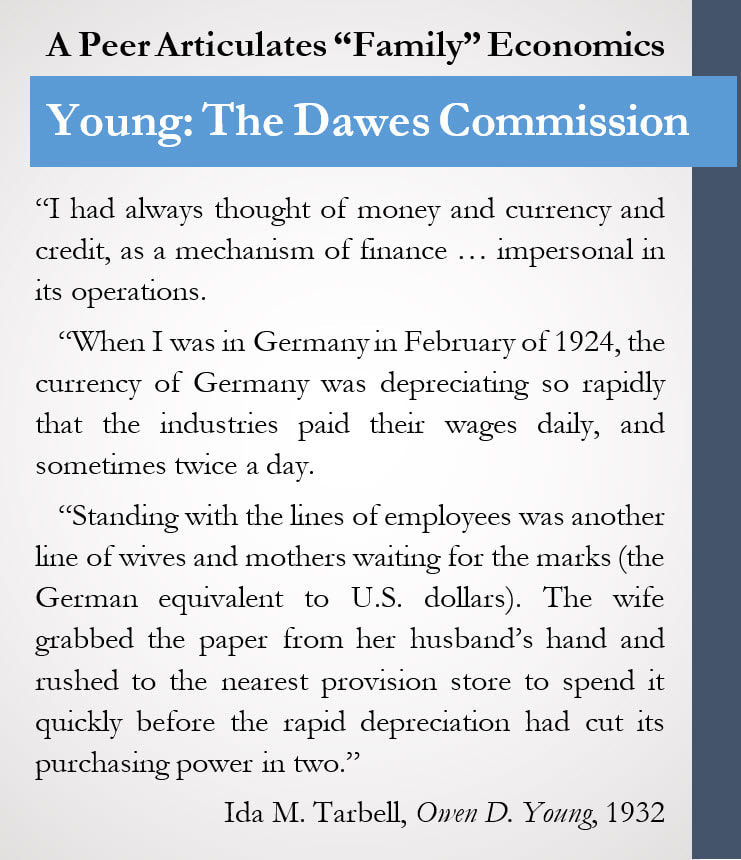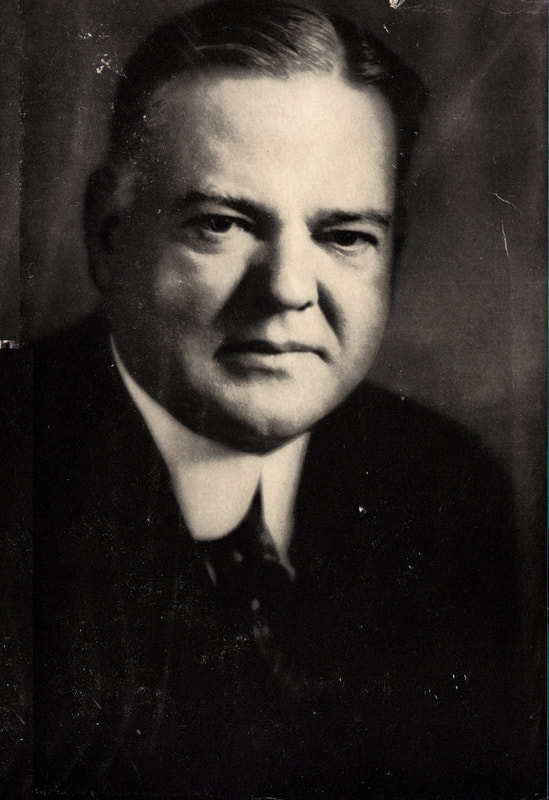A Review of "The Problems of Lasting Peace"
|
|
Date Published: July 1, 2021
Date Modified: June 30, 2024 |
What were the credentials of Herbert Hoover and Hugh Gibson to write about the problems of a lasting peace?
"I have been with him [Herbert Hoover] during the years when a people who once honored and revered him for his achievements in engineering, in administration, in practical philanthropy, in diplomacy, in the feeding of the world, turned upon him with vilification and hatred. And I have seen him come out of the torture of the spirit a gentle, kindly man without malice, without hatred, without vengeance, a Quaker driven by a religious faith that knows no restraints to devote his remaining years to the ideal of peace. … He and Gibson began working together twenty-eight years ago.
"Gibson was in the diplomatic service of the United States during the whole of that period. … The beginning of the last war [World War I] found him in Belgium. … During 1918 and 1919 he was attached to Hoover’s relief work. … Hugh Gibson has been our ambassador to Belgium, Poland, Switzerland, and Brazil. …
"These two experienced men have joined their knowledge and wisdom to discuss the case of war and peace."
"Gibson was in the diplomatic service of the United States during the whole of that period. … The beginning of the last war [World War I] found him in Belgium. … During 1918 and 1919 he was attached to Hoover’s relief work. … Hugh Gibson has been our ambassador to Belgium, Poland, Switzerland, and Brazil. …
"These two experienced men have joined their knowledge and wisdom to discuss the case of war and peace."
George E. Sokolsky, "These Days," 1942
A Review of "The Problems of Lasting Peace" by Herbert Hoover and Hugh Gibson
- Reviews of the Day: 1942
- Selected Excerpts: Hoover and Gibson Speak
- This Author’s Thoughts and Perceptions
- The Premise of "The Problems of Lasting Peace:" The Seven Great Forces
Reviews of the Day: 1942
|
“The Problems of Lasting Peace is so packed with meat that it is possible only to hit the highest of its high spots. … One of the most commendable things about it is the effort … to find common ground in the confused field of American world policy, on which all Americans can stand—whether they be “individualists” of traditional Republican background or “collectivists” of New Deal convictions. …
“Most of the controversies stirred up by this book will be constructive, not divisive, because the authors have made an intensely honest, impartial effort to help raise—in the words of George Washington—“a standard to which the wise and honest can repair.” Editorial, “Common Ground on Peace,” 1942
|
“There are many, even now, who wave aside as premature any present consideration of postwar problems. … That wait-and-see attitude has at least two serious flaws. … If the tragic errors of Versailles are not to be repeated, we must think and plan ahead what our course as victors shall be. … For those who would do so intelligently and in the light of long and practical experience, there is no more valuable aid than that contained in the just-published book, The Problems of Lasting Peace.”
Ralph W. Trueblood, “How We Can Also Win the Peace,” 1942
“The competence of the two collaborators to discuss the matter [of peace] is manifest in their experience. … Two points that they make seem worthy of special note: First, their sober admonition that a policy of vengeance directed against whole peoples is utterly incompatible with real peace; second, their pertinent reminder that if the four freedoms—of speech and worship, from want and fear—are to be realized, a fifth must be added—economic freedom.”
Editorial, “The Problems of Lasting Peace,” 1942
“Every once in a while, men with governmental experience and background give themselves unreservedly to the preparation of a book done objectively, fairly, and non-partisanly. They perform a service of transcendent value to their fellow-citizens. Such a book—it may prove the most valuable work of our times—has just been published. … It is called The Problems of Lasting Peace.”
David Lawrence, “The Problems of Lasting Peace,” 1942
Selected Excerpts: Hoover and Gibson Speak
On Nationalism:
"Nationalism can be both a cause of war or a bulwark of peace and progress. The values of nationalism cannot be ignored because of its secondary evils.
|
"Where it is an impulse to strive for independence from oppression, for defense against aggression, it makes for war.
"But independence and spiritual unity, pride of country, constructive rivalry, the building of national cultures out of cohesive mores, the better conduct of government in areas of unity of thought and purpose bring more flowering of progress and the expansion of cultural institutions, scientific research, art, music, and literature. Nationalism in the best sense is a satisfaction, a fulfillment. … |
Herbert Hoover and Hugh Gibson from dust cover of "The Problems of Lasting Peace"
|
"Nationalism can readily expand into dangerous forms—greed in exploitation of the resources and foreign trade of other peoples and in aggression which quickly turns into imperialism."
On Individual Leadership: Statesmanship
"We must not overlook the part which individuals may play. When great crises arise from these forces, they must be dealt with by statesmen. No student of history can ignore the part such men have played in the crises of war and peace.
"When these great pressures are met successfully, it means peace; when there is failure, it means war or the seeds of war. The leaders in times of crisis may be men of ability, character, courage, and vision. Or they may be men of ignorance, incompetence, consuming vanity, egotism, ambition, or corruption. They may be Utopian dreamers. They may be a mixture of these characteristics, good and bad. …
"We agree that they have an immense responsibility. But the character of men should not obscure the fact that the fundamental approach to the problems of peace and war lies in recognition of the [seven] great forces in motion."
"When these great pressures are met successfully, it means peace; when there is failure, it means war or the seeds of war. The leaders in times of crisis may be men of ability, character, courage, and vision. Or they may be men of ignorance, incompetence, consuming vanity, egotism, ambition, or corruption. They may be Utopian dreamers. They may be a mixture of these characteristics, good and bad. …
"We agree that they have an immense responsibility. But the character of men should not obscure the fact that the fundamental approach to the problems of peace and war lies in recognition of the [seven] great forces in motion."
Study of the Past Approached with Meekness, Suggests Solutions
|
"In our discussions nowadays, we are inclined to assume that our own generation is the first to see the light, and that we have brought to bear on the age-old problems of war and peace a new vision and a new intelligence.
"A study of the past is always a wholesome corrective for this assumption of superiority. Man is not blessed with as much foresight as he is with wonderful hindsight—the ability to profit from his or her hard-earned experiences." On Personal Liberties and the Government
|
Hindsight improves foresight
|
"The definition of personal liberty varies from time to time and from race to race, for it is modified by the whole racial history of peoples. But there are two essential common denominators.
- "The first common denominator is the concept of the dignity of man and his personal rights. And, included in this concept, is that these rights are an endowment by the Creator and are unalienable by the state or any other domination."
- "The second common denominator is the political foundation of government upon laws made by the people’s freely chosen representatives and not by any arbitrary power. This ideology of personal liberty based its faith of progress in spiritual, intellectual, and economic life upon the sum of individual accomplishment, not of governmental action."
On Socialism and Communism
"These systems [Socialism and Communism] were basically more materialistic than the systems of liberty, because their whole thesis was to make a god of economic equality and to lessen intellectual and spiritual liberty. Socialism and Communism guaranteed security without risk, and all human blessings without striving."
On the Theory of Balance of Power
"Its [the balance of power’s] essential base is to maintain a situation where nations modify their aggressiveness by fear of defeat. Fear of defeat always modifies aggressiveness even in the jungle. … Although the balance of power is described as a “just equilibrium,” governments are constantly seeking to secure not so much an even balance as preponderance for their own side [through alliances], and this leads to ultimate conflict. …
"The effect of these combinations is to make war on a much wider front by drawing in many nations not directly part of the controversy.
"This was essentially the case in 1914."
"The effect of these combinations is to make war on a much wider front by drawing in many nations not directly part of the controversy.
"This was essentially the case in 1914."
On America's Purpose in World War I
|
"No one … can read the ideals and aims expressed by President Wilson without accepting the fact that, so far as the United States was concerned, this [world war] was dominantly an armed crusade to defeat aggression and to make personal liberty and representative government supreme in the world.
"These aims were supported by the American people and were quickly coined into popular terms of “war to end war,” “to make the world safe for democracy,” “to destroy militarism and aggression,” “to bring freedom to mankind”—all are ample evidence of the character of the American purpose. |
The U.S. sacrificed the lives of its sons in an effort called a “war to end all wars"
|
"If further proof were needed of our major idealistic purpose, our self-denying ordinances of no annexations of territory and no indemnities amply indicate that there was no imperialism or nationalism behind American purposes. With only a police army, we had no militaristic pressure. We were under no economic pressures of any kind. There was no inherent hate of Germany or Austria. Our declarations that we had no purpose of vengeance or punishment of the enemy peoples further emphasized this.
"In fact, before 1914 the general feeling throughout the nation was perhaps more friendly to Germany than to Britain. There was no fear of invasion of our continent or loss of our independence. We had no internal pressure of any kind for which politicians needed diversion of public mind to foreign affairs and war.
"The will to peace ran high among us. So, when we did go to war, it was the most gigantic crusade of all history."
"In fact, before 1914 the general feeling throughout the nation was perhaps more friendly to Germany than to Britain. There was no fear of invasion of our continent or loss of our independence. We had no internal pressure of any kind for which politicians needed diversion of public mind to foreign affairs and war.
"The will to peace ran high among us. So, when we did go to war, it was the most gigantic crusade of all history."
|
Lastly, the Concept of "Total War"
"In earlier times, armies and navies called out only a fraction of the population. Their support required only another fraction. There was only a fractional disruption of economic and social life during war. …
"The invention of the gas engine made possible the truck, the airplane, the submarine, and later the tank. … |
A new "total war" emerged in World War I
|
"Huge, specialized factories and millions more of mechanics were required to support the larger [and more complex] armies. …
|
Frederick W. Nichol ran IBM's World War II
"Logistics Department." |
"The calling of the maximum manpower to the fighting front and the need of maximum supply services for them required, for the first time, total mobilization of the civilian population … a profound revolution. … Truth proved the first fatality. … Total war bred total intolerance. … Total war created more hideous brutalities … [as] … total war was a war of civilian effort against civilian effort as well as of armies against armies. …
"Total war became a war of armies against civilians. … Total war, from the brutalities to civilians, produced total hate and total demand for revenge. Hate enveloped the mind of every man, woman, and child. It was not directed solely to the enemy leaders, but to every individual in enemy countries. Soldiers fighting at the front had far less hate than civilians. … Total war, flogged on by the propaganda of hate, had no terminal short of the surrender of one side or the other through defeat or exhaustion.
"And in that respect the victor was but one lap ahead of the vanquished." |
Other Topics of Consideration
The book also does a deep dive into:
- American misunderstanding of the problems of Europe: “We had grown far apart in our thinking.”
- The need to hold political and military leaders accountable as criminals and not as some sacrosanct set of individuals who were above the law.
- The need to dismantle any warrior caste.
- That statesmen are never “free agents.” They are subject to the fear, hate, and revenge of the governed.
- The effects of the devaluation of the dollar or other foreign currencies.
This Author's Thoughts and Perceptions
|
The Premise of "The Problems of Lasting Peace:"
The core of the book revolves around the study of the history of war and peace, and mankind’s attempts to establish peace after each of the wars examined. The two authors propose that war and peace are rooted in seven great forces. The following are short summaries of those forces. They do little justice to the detailed discussions and analyses in the book. As one reviewer wrote above, there is a lot of “meat” between the two covers.
|
The seven great forces working for war or peace
|
- The Forces of Fear, Hate, and Revenge are the constant agitating forces for war. They seek diplomatic action, support, and military alliances. The humiliations and privations of any prior military defeat or economic punishments create an undying demand for revenge.
Furthermore, with World War I the new concept of “total war” came into being. The chivalry of war was now dead. War was declared on whole nations: men, women, children, and infrastructures—the indiscriminate destruction of cities, farms, roads, and bridges, widened the girth and extended the time for recovery from war. Such wrongs live for centuries in the minds of people. The affected demand restitution, and the leaders rarely stand against such entrenched beliefs of the people.
It seems that age-old hates are burned into peoples’ souls.
- Ideologies such as Christianity, Islam, the Divine Right of Kings (Emperors), Liberalism, Conservatism, Communism, Fascism, Nazism, Individualism, and Collectivism constantly shape and form the world. Ideological wars, though, are more cruel and bitter than wars of conquest.
Some ideologies can make for war … or peace.
- Economic Pressures to provide goods and services within a community creates social and economic forces and pressures. The authors acknowledge the large part this force plays as one of the seven forces. They do not adhere to a philosophy of complete “economic determinism” in history, but they acknowledge that the first world war’s economic aftermath was one of the primary causes of the “collapse of the world” into a second world war.
- Imperialism is defined as “the movement of races over their racial borders.” The authors propose that modern imperialism comes in one of three ways: economic expansion into unpopulated areas, expansion into areas of perceived uncivilized races, or expansion for the sake of sheer conquest. They propose that domination and exploitation of other races is one of the “eternal causes” of war.
- Militarism provided for the common defense through the instantiation and maintenance of a “warrior class” or caste—age-old institutions that were too often seen as a necessity for survival. The authors saw man as a combative animal. He loves contests. He hates easily. He is an egoistic animal, and in the mass becomes more egoistic. A man who believes in his superiority all too quickly becomes arrogant, and that is one of the stimulants of aggression. The pomp and glory of war have an appeal to man. He loves adventures and some make a living seeking glory in a militarism grounded in one of the other forces: fear, hate, and revenge.
The military caste was left in place in Germany after the Treaty of Versailles, and the authors propose that this was one of the major contributors to World War II.
- Nationalism develops from the deepest of primitive instincts and emotional forces in mankind. A common language, religion, folklore, traditions, literature, art, music, beliefs, habits, hates and fears, and tribal loyalties bring both unity within and a willingness for men and women to fight without for their hearths and homes—many times symbolized by a flag.
Nationalism and its natural yearning for independence, while binding together a smaller community can rip and tear at the larger community—a bulwark of peace and progress or a cause of conflict and war. Extreme nationalism as an outlet for racial glory destabilizes peace.
Nationalism will be forever with us and must be provided for in any solution.
- The Will to Peace stands against all the forces which make for war. The cost of war is forever in the back of mankind’s mind. The search over the centuries by men and women of good will to find the methods of lasting peace testify to this forces’ movement within the spirit of good men and women.
Because of the will to peace, the leaders of countries where this is an overriding preventative to war, must justify war as a “defensive war” or as a war to “secure or maintain peace.”
Ensuring lasting peace requires an understanding of these seven forces, their interactions and ensuring that the negative forces of each are controlled and the positive forces reinforced.
|
So, why did I read this book and what thoughts did it stir? |
I read this book for two reasons:
- Second, after reading and reviewing The Ordeal of Woodrow Wilson by Herbert Hoover which was published sixteen years later, I wanted more insights into his ideas and beliefs.
Starting the book, I was intrigued with discovering why Watson recommended it.
As I read, I wondered if he saw a new path to a peace. Did he see how doomed his 1937–39 peace efforts were because no matter how hard he worked to plant, water, and fertilize the will for peace in so many nations [In 1937 and 1938, he spent 1 out of every 2 days in Europe; in 1937, he visited 13 nations to talk world peace through world trade to these countries’ political and economic leaders as the new President of the International Chamber of Commerce] and no matter how hard he fought for a fair balance of trade between small and large countries, there were five other distinct elements working against him? Would he have done anything differently if this book had been published in 1936 rather than 1942–43? After reading the book, one wonders if any one individual could have done anything differently to achieve a different outcome.
As I read, I wondered if he saw a new path to a peace. Did he see how doomed his 1937–39 peace efforts were because no matter how hard he worked to plant, water, and fertilize the will for peace in so many nations [In 1937 and 1938, he spent 1 out of every 2 days in Europe; in 1937, he visited 13 nations to talk world peace through world trade to these countries’ political and economic leaders as the new President of the International Chamber of Commerce] and no matter how hard he fought for a fair balance of trade between small and large countries, there were five other distinct elements working against him? Would he have done anything differently if this book had been published in 1936 rather than 1942–43? After reading the book, one wonders if any one individual could have done anything differently to achieve a different outcome.
|
He must have seen his mistakes—or his inadequacies—in the book. He and other businessmen like Owen D. Young (see sidebar), had attempted to address their areas of expertise—business, economics, and commerce. The authors did describe these as one of the most pressing post world war issues; but it was only one of seven forces—and the other forces were fighting them at every turn.
Watson managed to move past these mistakes to push for a new future—maybe, this time, realizing he was only one piece in a much larger puzzle. He could not control or guarantee results. He fought for the League of Nations and it failed, but the United Nations and the peace processes that followed the end of World War II succeeded as Europe and many other nations of the world were saved—including the Axis powers of Japan, Italy, and Germany. As a man of hope and optimism, he must have read the book and seen the future elements of the Marshall Plan within its covers. Of course, this is a supposition with little supporting evidence other than Watson’s advocacy of this work of Herbert Hoovers, his support of George Marshall and the Marshall Plan, and my decade of personal research into the ol’ man’s ideas and ideals.
|
"Money" is only as good as the people's faith in its stability and worth over time.
|
This is an amazing book, but its true power was revealed as I read the 1942–43 reviews and wrote up this personal review. The depth of knowledge and insight overpowers a single read. A college curriculum could be built around its core assumptions and analyses.
When I went back to reread my highlighted passages, I kept shaking my head at the applicability to today’s world:
Currently, more than any time in history, we are going to need statesmen on par with those who led the reconstruction of Europe after World War II.
- The continued strength of ideologies in the world with the conflicts in Gaza
- The destruction of representative governments around the world in Russia, Turkey, Latin America, and so many other countries as to defy listing them all
- The rise of nationalism in the leadership of China and its imposing claims on the waters in the South China Sea
- The way leaders are using economic pressures to gain advantage—waging economic battles
- Wondering if there are military castes seeking glory and territory coming to power in China, Russia and other nations
- The forces of fear, hate, and revenge seem to be working everywhere without … and within … the United States of America
Currently, more than any time in history, we are going to need statesmen on par with those who led the reconstruction of Europe after World War II.
Nations can blunder into war. They cannot blunder into peace. |
The Problems of Lasting Peace
May we find such elevated-in-spirit statesmen again, before we blunder into new wars.
I can now recommend a good book for them to read!
Cheers,
- Pete
Cheers,
- Pete
